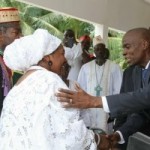.
While Martelly, a performer-turned-politician, seems almost as if he’s still campaigning for office, dashing from one public event to the next, issues pivotal to Haiti’s prospects for stability and prosperity remain unresolved.
“Martelly has discovered that the job was tougher than he thought,’’ said Daly Valet, publisher and editor-in-chief of Le Matin, a Port-au-Prince-based newspaper. “He’s a president who wants to do some things, but he doesn’t have the opportunity and institutional framework to do it, so he’s trying to grab everything that can make him look good.’’
Martelly’s administration faces severe short-term challenges, including a looming fuel and food crisis, hurricane season, the start of the school year and a surging cholera epidemic in the countryside. Public investments continue to languish, unemployment hovers above 70 percent, hundred of thousands remain homeless, and the International Monetary Fund has lowered its growth projections for this year to 8.6 percent from 10 percent. Thursday, a week after 28 people died in flooding, Haitians were warned to prepare, yet again, for heavy rains.
“People are going to get more and more frustrated as the rains fall and as hope that was generated by the promises of the election and the inauguration seem to be dissipating in ‘politics as usual,’ ” said Mark Schneider, a longtime Haiti observer with the International Crisis Group. “Haiti needs a government in place to work together on resettlement and on reconstruction and it needs it now.’’
Instead, there are disquieting signs of political paralysis:
• Martelly has no government, and the prospects that parliament will approve his choice for prime minister, Daniel Rouzier, are uncertain.
• The president has mishandled his relations with the influential Haitian diaspora, the vast population of Haitians living abroad, which had seen his election as a chance for greater influence on their homeland.
• Martelly’s policy toward the Interim Haiti Recovery Commission, the principal U.S.-backed vehicle for reconstruction, is in doubt, following contradictory statements about its future from his team.
The biggest problem facing Martelly concerns his nomination of Rouzier, a 51-year-old U.S.-educated entrepreneur, as prime minister. Despite vigorous lobbying on Rouzier’s behalf by former President René Préval, whose political coalition holds a comfortable majority in both chambers of parliament, Rouzier’s supporters realize his prospects remain uncertain.
“They have good reasons to be concerned. I don’t think the Martelly team knows exactly what to do and how to handle the relationship with the parliament,’’ Valet said. “At the parliamentary level, they are eager to collaborate with Martelly, but they feel that Martelly’s people are pretty arrogant and they don’t want to play traditional politics.’’
At the moment, a parliamentary commission charged with reviewing Rouzier’s qualifications is expected to present a report early next week. The commission has raised issues about missing documents and relative technicalities, prompting fear that its members are trying to obstruct the nomination. This has made for a confusing situation fueled by distrust, with Martelly recently going so far as threatening to dissolve parliament.
 Haïti – Politique : Moïse commémore les 226 ans de la cérémonie de Bois Caïman
Haïti – Politique : Moïse commémore les 226 ans de la cérémonie de Bois Caïman Haïti – RD : Les autorités militaires dominicaines appuient la formation d’une armée en Haïti
Haïti – RD : Les autorités militaires dominicaines appuient la formation d’une armée en Haïti Haïti – AVIS : Moratoire sur l’octroi de fréquences de radio FM
Haïti – AVIS : Moratoire sur l’octroi de fréquences de radio FM Haïti – FLASH : 94 morts par balles pour les 6 premiers mois
Haïti – FLASH : 94 morts par balles pour les 6 premiers mois
Leave a Reply